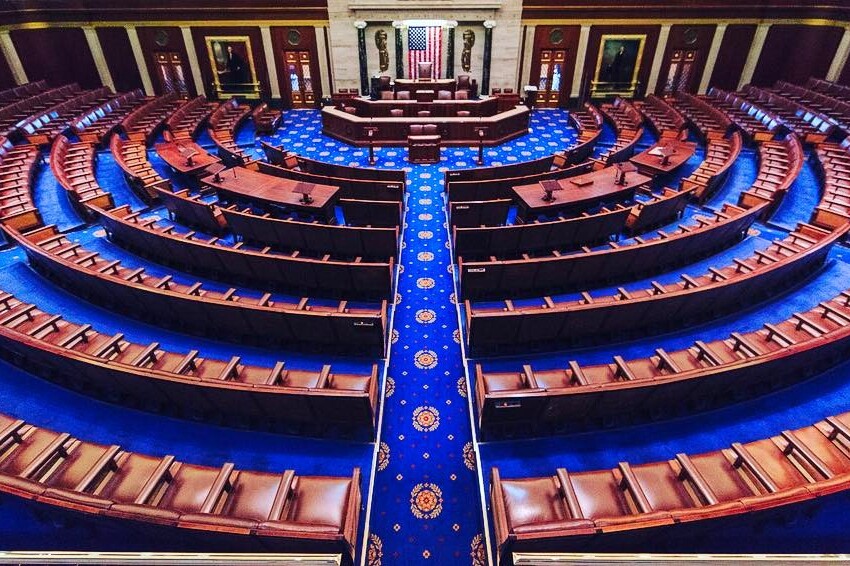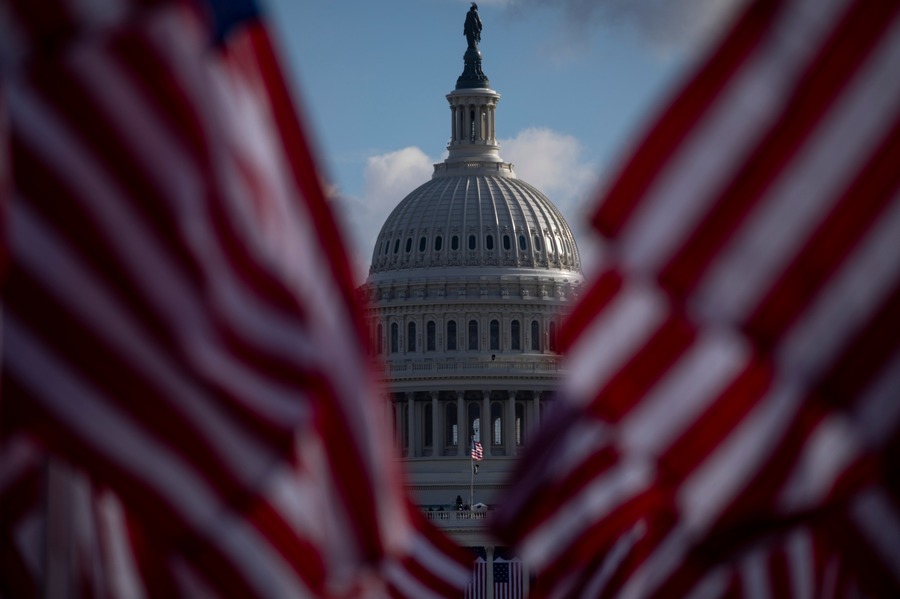The House Reconciliation Bill’s AI Preemption Clearly Violates the Byrd Rule
It strains credulity to claim that broad preemption of state AI regulation for the next decade is a necessary term or condition of an appropriation of $500 million for the Department of Commerce to update its internal AI and information technology systems.

The House of Representatives recently voted to approve the budget reconciliation bill. Officially the One, Big, Beautiful Bill Act, it contains a provision (sec. 43201(c)) imposing a 10-year bar on state and local governments enforcing “any law or regulation” concerning artificial intelligence (AI). The provision does include an exemption for criminal law and some of the provision’s supporters claim it exempts “generally applicable law,” but this claim does not appear to be supported by either the text that passed the House or the earlier version that passed out of committee.
This sort of sweeping federal preemption, in the absence of any substantial federal policy addressing the concerns that might motivate subnational legislation, is unprecedented. The closest Congress has come is narrower deregulatory preemption legislation like the Internet Tax Freedom Act, which preempted state and local taxes on internet access and discriminatory taxes on e-commerce, and the Airline Deregulation Act of 1978, which preempted state economic regulation of airline “rates, routes, or services.” This provision, by contrast, would preempt an extremely wide swath of state AI regulations, including measures to protect privacy, public safety, critical infrastructure, election integrity, and children’s mental health, without enacting any substantial federal policy. This alone makes the provision a radical step.
Subject to the limits imposed by the Constitution and by its own rules, of course, Congress is free to take aggressive policy actions if the requisite coalition supports it. However, this provision almost certainly lacks the support to pass through Congress as ordinary legislation, subject to a Senate filibuster. Perhaps for that reason, the provision was included in a budget reconciliation bill. The budget reconciliation process, created by the Congressional Budget Act of 1974, enables certain budgetary legislation to pass under a special streamlined procedure that limits the length of debate on the Senate floor. Among other benefits, this means that budget reconciliation bills, unlike ordinary legislation, can advance through the Senate without needing to overcome the threat of a filibuster. Rather than needing 60 votes to invoke cloture, reconciliation bills can proceed with the support of a simple majority.
But the budget reconciliation process has its limits, the most important of which is the Byrd Rule, named after the late Sen. Robert C. Byrd (D-W. Va.). Under the Byrd Rule, each provision of a bill passed under the budget reconciliation process must satisfy several criteria. Among these requirements, each provision must “produce a change in [federal] outlays or revenues.” Moreover, that change in federal spending or taxation must not be “merely incidental to the non-budgetary components of the provision.” If any provision fails to satisfy these or any other of the Byrd Rule’s requirements, any senator can raise a point of order on the Senate floor claiming the provision is in violation; if the Senate’s presiding officer rules that the language does not comply with the Byrd Rule, it takes 60 votes to successfully appeal that ruling. In practice, the Senate parliamentarian vets the bill for potential violations before it comes to the floor, hearing arguments from both parties as to whether a particular provision satisfies the Rule’s criteria. Generally, provisions that she advises are “extraneous” are removed from the bill draft before it is considered by the full Senate. (This assumes the majority party follows the parliamentarian rather than ignoring or overruling her, as is standard practice.)
The AI regulatory preemption provision of the House reconciliation bill falls short of producing a change in federal taxes or spending that is “not merely incidental.” While one can imagine downstream effects of state AI law and regulation on the federal budget, perhaps via the cost for agencies to procure AI products or services, any such effects would be highly attenuated and incidental to the primary, non-budgetary purpose of the provision. Technically, provisions that lack a direct non-incidental impact on federal spending or revenues can still pass muster under the Byrd Rule if they serve a necessary term or condition of a budgetary provision. But it strains credulity to claim that broad preemption of state AI regulation for the next decade is a necessary term or condition of an appropriation of $500 million for the Department of Commerce to update its internal AI and information technology systems.
Compare two recent provisions that the Senate parliamentarian advised were extraneous under the Byrd Rule. In 2021, the Senate parliamentarian advised that the budgetary effects of a minimum wage increase were “merely incidental.” Even though the Congressional Budget Office score indicated that an increase in the federal minimum wage would have substantial budgetary effects (e.g., increasing wages for some federal workers, potentially affecting outlays for programs like Medicaid and SNAP, and impacting tax revenues), the parliamentarian reasoned that the primary purpose of the provision was a broad change in labor policy. The near-total preemption of state-level AI laws is likewise a major regulatory policy choice but has a much less clear nexus to the federal budget.
Also in 2021, the parliamentarian advised that provisions providing legal status or work permits for certain undocumented immigrants were extraneous. Her reasoning, as reported, focused on the fact that changing immigration status was a "tremendous and enduring policy change" and that the budgetary effects, while present, were outweighed by or merely incidental to this fundamental policy shift. Like an increase in the federal minimum wage, granting legal status to undocumented immigrants would have much more direct impacts on federal revenues and outlays than preemption of state AI regulation. Together, these precedents strongly indicate that the AI regulatory preemption provision is extraneous to a budget reconciliation bill. In both of these cases, the Democratic Senate majority accepted the parliamentarian’s ruling.
Given the clear incompatibility of this sweeping ban on state AI regulation with the rules of budget reconciliation, Congressional Republicans have a limited set of options for enacting this policy change. First, they can hope that no senator raises a point of order objecting to the inclusion of this provision, allowing it to sail through. This outcome is unlikely. Sen. Edward Markey (D-Mass.), for instance, strongly objected to the provision, saying “The Republican 10-year moratorium on state AI regulation won’t lead to an AI Golden Age. It will lead to a Dark Age for the environment, our children, and marginalized communities.”
Second, Senate Republicans can try to pressure the parliamentarian to rule that sweeping AI regulatory preemption is permissible under the Byrd Rule or fire her and replace her with someone more likely to sign off on the provision. This might work if the question were a close call, but this is not. It would take extraordinary and unprecedented pressure to induce the parliamentarian to advise that this provision is not extraneous, and even such pressure might be insufficient. It would also cut against the stated commitments of Republican senators like former Majority Leader Mitch McConnell, former Majority Whip John Cornyn, Lindsay Graham, and Susan Collins to protect the parliamentarian’s role as an impartial arbiter of Senate rules. Graham, in the context of the 2021 effort to include immigration provisions in the Build Back Better Act, stated that “the parliamentarian’s guidance reinforces long-held traditions of the Senate that major policy changes should be done collaboratively and not through the reconciliation process.” He continued, “This decision reinforces the fact that the Senate is truly different than the House.”
Finally, Senate Republicans could have the presiding officer ignore the parliamentarian’s advice and table an appeal of that ruling, which only requires a simple majority vote. While this would be consistent with Senate rules, it would represent a major breach of the norms of Senate procedure. Indeed, earlier this year, Senate Majority Leader John Thune announced his opposition to overruling the parliamentarian to push border security and tax provisions through budget reconciliation, declaring it “totally akin to killing the filibuster.” If Thune is unprepared to overrule the parliamentarian for border security and tax provisions that have long been central concerns of the Republican Party, he is unlikely to do so for an AI preemption issue that few understand. Perhaps in recognition of this reality, Senator Ted Cruz (R-Texas) has indicated plans to introduce a similar provision into ordinary legislation.
While there is room for reasonable disagreement about the merits of the filibuster rule, Republican leaders are on the record heralding its importance. Undermining that rule in the service of a sweeping and unprecedented effort to curtail the authority of state and local governments to protect their citizens against the risks posed by AI would be a major and unwarranted step. If Congressional Republicans move forward with this course of action, it will be crucial to acknowledge the radicalism of that choice.





